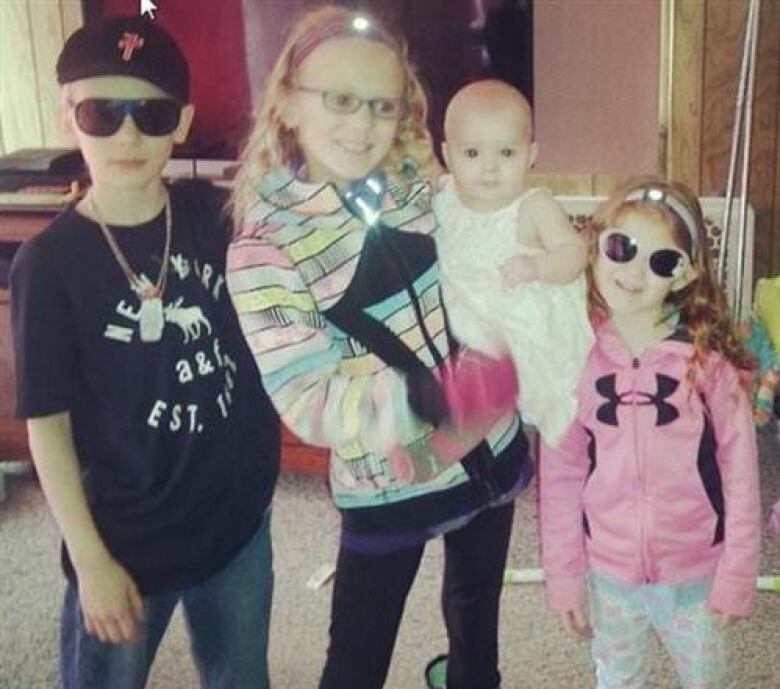Family of Tisdale, Sask. murder victims still reeling 1 year later
Latasha Gosling's sister shares story to help other victims of domestic violence
Everything changed a year ago for Laura Gross.
Her sister, Latasha Gosling, and three of Gosling's children, Jenika, Landen and Janayah, were killed in their home in Tisdale. RCMP said Gosling's boyfriend fled with their six-month-old baby to Prince Albert, where he killed himself at his mother's house. The baby wasn't hurt.
As Gosling's sister, Gross said it was a terrible shock to both families, and she knows they're both still struggling to deal with the losses. Gross added that the baby is doing well, but she won't say who is caring for her out of respect for her privacy.
She said that of the upwards of $37,000 in pledges by concerned people following the deaths, some went toward funeral costs, and the rest will be for the baby girl.
"My sister was an amazing mother, an amazing sister, and an amazing daughter. And my nieces and nephew were my life. They were my everything and I miss them," she said, breaking down. "It doesn't get any easier."
Gross said the passage of time doesn't make it any easier to face what happened. She also found out that when her sister's story made the news, so many people learned about their deaths, but few people learned about their lives.
Now she finds comfort in stories, memories and photos of them. Sometimes, she said she feels like her late sister, nieces and nephews are giving her signs in difficult moments, such as during visits to their burial place, and in her dreams.
"She just smiled and hugged me and I knew that I didn't want to let go of her. But that's when I woke up," Gross said, describing a dream about Latasha standing beside her quietly in a field. "I think it was her way of just letting me know like, they're OK. They're together. And ever since then I've been having good dreams of her."
Signs important to grieving sister
Now she wants people to be on the look out for another kind of sign: the signs of domestic violence. She wants people to know they shouldn't be afraid to tell anybody, and that they should get out of abusive situations if they can. She said she had no warning signs for what happened in her sister's case.

She's said she's not angry and knows Gosling's boyfriend's family is hurting, too. She's hoping that the two sides can continue to be supports for one another.
Gross said while it's difficult, theirs is a story that needs to be told, and someday she hopes she can help people learn more about what happened and how they can prevent it.
Latasha and Laura's dad isn't ready to speak about what happened, but he penned a letter saying he doesn't want anyone else to become victims like his daughter and grandchildren did, and urging people not to be afraid to reach out and get help.
"It's almost a year when we got the shocking phone call that our daughter and grandchildren were murdered... Don't say, 'I can handle this'. Because you can't," Randy Gross wrote.
New crisis shelter planned for Melfort

Its 16-bed crisis shelter that was still being built in Melfort is nearly ready for clients, with an expected opening at the end of May. Executive director Louise Schweitzer said last year nearly 500 calls were made to its crisis line and 17 of them requested shelter from violence.
She says the most dangerous time for someone facing violence at home, is the time when they try to flee. That's why they employ top-of-the-line security features and policies.
Schweitzer shared some advice for anyone who suspects they know someone facing domestic violence:
"Believe them. Give them safety. don't make the choices for them, allow them to make those choices but always be there for when they're ready. Sadly the statistics are that they will leave eight times before they leave for good. Don't walk away from them. Just keep supporting them," she said.
Statistics Canada said just over one third of spousal violence victims reached out to formal support systems such as a crisis line, but 68 per cent of them confide in someone about what's happening.
'They live on' in memories of loved ones
Gross said Latasha's, Jenika's, Landen and Janayah's short lives are full of great stories that illustrate their love, such as when Latasha talked her into getting a 'sister tattoo' that seems more poignant now than ever.

"I got mine on my back and my sister got hers on her lower back. And the one that she picked out, my tattoo, says 'as life goes on our paths may change', and my sister's says 'but the bond between us will remain forever strong.'
It makes a lot of sense right now," she said.
Gross says she's making sure they'll live on through memories like that, showing just how loving and close-knit the family was.
"Her kids were her first priority. Her kids were her life. And she'd do anything for them. And she did," she said.

